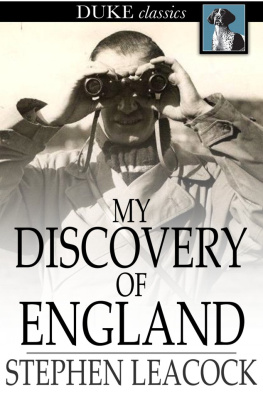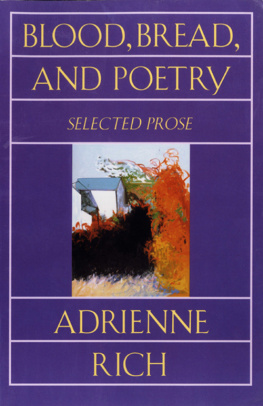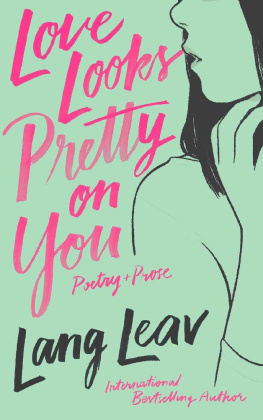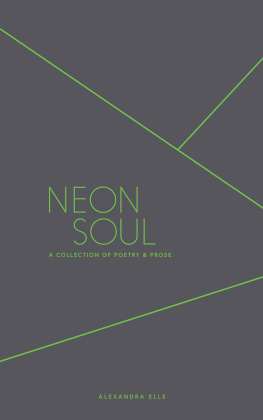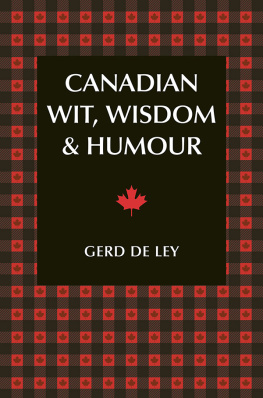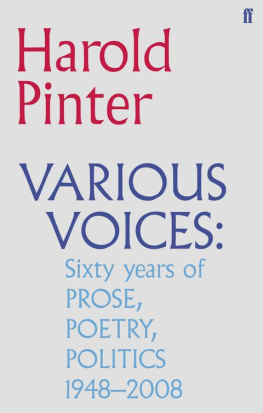Ernest Buckler - Whirligig
Here you can read online Ernest Buckler - Whirligig full text of the book (entire story) in english for free. Download pdf and epub, get meaning, cover and reviews about this ebook. year: 2013, publisher: McClelland & Stewart, genre: Detective and thriller. Description of the work, (preface) as well as reviews are available. Best literature library LitArk.com created for fans of good reading and offers a wide selection of genres:
Romance novel
Science fiction
Adventure
Detective
Science
History
Home and family
Prose
Art
Politics
Computer
Non-fiction
Religion
Business
Children
Humor
Choose a favorite category and find really read worthwhile books. Enjoy immersion in the world of imagination, feel the emotions of the characters or learn something new for yourself, make an fascinating discovery.

- Book:Whirligig
- Author:
- Publisher:McClelland & Stewart
- Genre:
- Year:2013
- Rating:5 / 5
- Favourites:Add to favourites
- Your mark:
- 100
- 1
- 2
- 3
- 4
- 5
Whirligig: summary, description and annotation
We offer to read an annotation, description, summary or preface (depends on what the author of the book "Whirligig" wrote himself). If you haven't found the necessary information about the book — write in the comments, we will try to find it.
Whirligig — read online for free the complete book (whole text) full work
Below is the text of the book, divided by pages. System saving the place of the last page read, allows you to conveniently read the book "Whirligig" online for free, without having to search again every time where you left off. Put a bookmark, and you can go to the page where you finished reading at any time.
Font size:
Interval:
Bookmark:
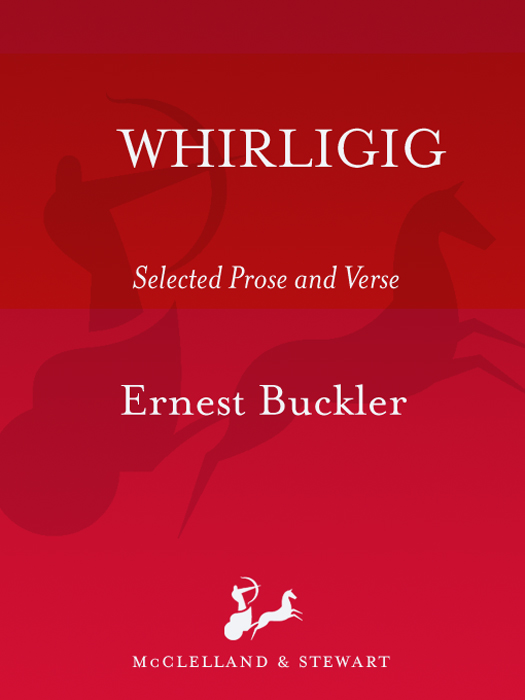
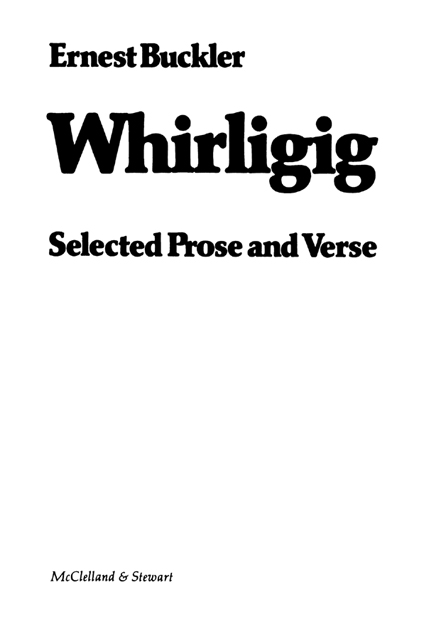
Copyright 1977 by Ernest Buckler
All rights reserved
The Canadian Publishers
McClelland and Stewart Limited
25 Hollinger Road, Toronto
Canadian Cataloguing in Publication Data
Buckler, Ernest, 1908
Whirligig
eISBN: 978-1-55199-511-3
I. Title
PS8503.U2W55 C817.54 C77-001394-5
PR9199.3.B82W55
v3.1
The Best Place to Be appeared in a slightly different version in the University of Toronto Graduate (Spring 1977).
Bestsellers Make Strange Bedfellows, Marriage TV Style, and Non! all appeared in earlier versions in The Atlantic Advocate.
This book will come as a surprise to Buckler readers. It may come as a disconcerting aberration to critics, who like their authors to move in a straight line, with an upward flourish at the end. But this book is an essential part of Buckler, the other side of the sage and serious artist. It will help to explain why in the five books that preceded this one he could maintain such a delicate balance between despair and hope. In those books the individual was alone, and sympathetic understanding between him and his fellows was a rarity. But in Whirligig the individual is a member of a group united by status and tradition, communicating through familiar words and traditions. Puzzled introspection has become automatic response; success is not won by inner struggle but by conformity to social patterns. It is a less demanding and, certainly, a less beautiful world than the one portrayed in the first five books; but is, for most of us, a more familiar and pervasive one. Its failures excite laughter, not tears. It is a world of which Buckler was always aware, and to which Whirligig is a sprightly introduction.
In the serious books Buckler, the individual, never appeared. He was a presence inseparable from his style. He emerges much more clearly in this book as the narrator who observes from a superior position. But we must not identify him completely with Ernest Buckler, the writer, who lives in an old farmhouse, on the highway to Annapolis, just outside Bridgetown. The narrator is much more of a professional farmer than Ernest Buckler (although a younger Buckler might resemble the narrator more closely in this respect.) The narrator has a wife, whereas Ernest Buckler is a bachelor. (Although the wife seems to be only a literary convenience, and, to all intents and purposes, the narrator is, like Buckler, a bachelor without hang-ups.) The narrator is an author with an income from his work roughly that of a Burmese coolie a level that, one can assume, Buckler has, in the last few years, exceeded. In literary taste the narrator is a determined individualist who has read widely although not as widely as Buckler. He has his own favourites, and does not hesitate to speak disrespectfully of Olympians, especially if, like Joyce and James, they have fathered an academic industry. The narrator has less respect for his literary work than Buckler has for his; he tends to agree with his neighbours that a man who neglects the duties of the farm to write fancy stories doesnt really count for much. There is also a Walter Mittynarrator who dreams, not of triumphs in the great world, but of comic failures.
Occasionally, the familiar serious Buckler emerges. He tells us of the agony of writing, of struggling to make words take on a life of their own; and momentarily he is the young David of The Mountain and the Valley: Words came out seeming like the furniture of a dolls house or wispy threads spun by a mixed-up spider out of his own gizzard. In The Best Place To Be he reminisces about his postgraduate days in the thirties at the University of Toronto with a pungent blend of wit and nostalgia. Best Sellers make Strange Bedfellows gives us Buckler the critic and the veteran book reviewer.
The narrator looks down on his world, but without rancour or a sense of conspicuous superiority. His world is divided between the rural, which is a place and people that he knows intimately and loves, and a fashionable literary and political world, which has no clear location and which he knows chiefly through its products books, magazines, performances on records, or TV. The pieces about the rural world turn into comic idylls: the people who listen in on the party line are not malicious snoopers or bureaucratic buggers, but parts of a friendly network. The literary and political world is less attractive. But it is populated not by villains, but by exuberant clowns and bad actors who believe the speeches they are given to recite. Only momentarily do we get a glimpse of the Bucklerian angst. In the analysis of bores, the cheerful, comic atmosphere suddenly clouds over; and the narrator refers to those vast Saharas of his grudging endurance with either company or circumstances in which he hadnt the slightest grain of interest while the meter that ate into the dwindling capital of time left to him ticked away as remorselessly as if he were having the spree of his life.
The mood of aloof detachment breaks down most often in the verse. Buckler has reserved his sturdiest antipathies for this medium womens lib, sexual explicitness, obscurantism in writing, religious intolerance and extremism. A mordant quality darkens the light tone:
Yes, His eye is on the sparrow.
But the toad beneath the harrow?
On the whole, the verse seems to me to be the work of a swaggering and uninhibited Ogden Nash less neat and finished than Nash, but with a stronger punch. The limericks vary in success, but there is one, on sexual explicitness on the stage, that was born a classic. The concluding line combines surprise, inevitability, and verbal wit all the requisites for a good limerick.
Whirligig is a book that Ernest Buckler had to write. It is a more direct expression of what and how he thinks than are the five serious books. But, unlike them, it is an occasional book, consisting of pieces that have been written at various times, the whole having no strong thematic unity. I have lived with many of these pieces for some time now, and I have my favourites. They take their place beside Leacock, Thurber, and Perelman, in my personal anthology of humour. I would begin with the piece about Christmas cards entitled Its Not the Thought, Its the Card. It is embarrassingly accurate (with just enough exaggeration to drive home its points). Analysis is balanced by dramatic illustration. It says the final words lightly, deftly, and cogently about a friendly ritual now stifled in snobbery and bureaucracy. It is what I call high humour. It kills not with a sword, but with a chuckle. Music When Soft Voices Die is in the same category. Advertising usually invites wild parody. But Buckler elects a subtler technique: the translation of an absurd statement into a dramatic narrative that strips away layers of nonsense as it proceeds. Ophelias letter to Ann Landers about Hamlet is the kind of rollicking common sense that Shakespeare would have relished. And I recognize with malicious pleasure all of Bucklers bores in Boring from Within.
C LAUDE B ISSELL
Not to sound like a mawkish Sigmund Romberg operetta (Gone are the golden days of youth), and quite mindful that nostalgia is a notoriously unreliable witness, I can say in all truth that my days at the University were among the happiest of my life. For several reasons. Somehow youth seemed younger then; had not yet leapfrogged in one bound from kindergarten to disenchantment. Thought was no stranger to it, but no one fancied himself a latter-day Coeur de Lion sent to purge the world of any infidels who did not share his own opinions, or filled his skull with assorted evangelisms before its fontanelle had quite closed. A love of campus was not yet considered camp. And despite the taunts (Naivete! Naivete!) which such sentiments may provoke, I still maintain that at that time the campus was the best place one could possibly be.
Font size:
Interval:
Bookmark:
Similar books «Whirligig»
Look at similar books to Whirligig. We have selected literature similar in name and meaning in the hope of providing readers with more options to find new, interesting, not yet read works.
Discussion, reviews of the book Whirligig and just readers' own opinions. Leave your comments, write what you think about the work, its meaning or the main characters. Specify what exactly you liked and what you didn't like, and why you think so.

